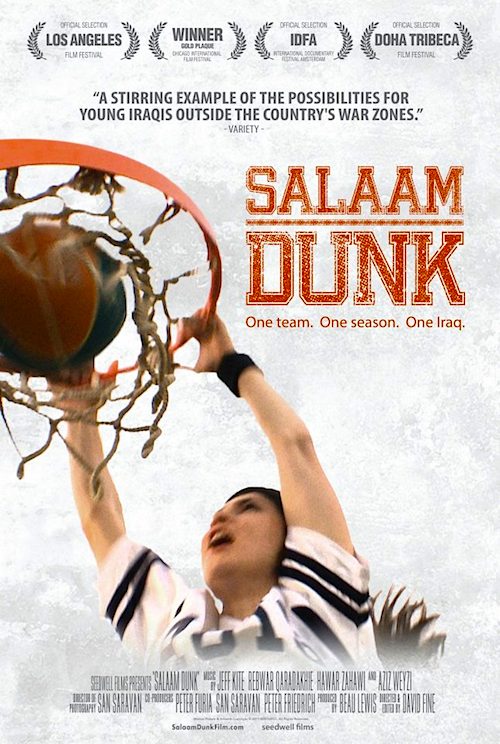By Joe Bendel. There was no Title IX in Iraq under Saddam. In fact, the general idea of gender equity that motivated the landmark legislation remains scarce throughout the region. Yet, two years after its founding, the American University of Iraq, Sulaimani (AUIS) fielded a pioneering women’s basketball team. They never won a game during their first season. David Fine documents their second in the truly inspiring Salaam Dunk, which screens as part of the 2012 Human Rights Watch Film Festival in New York.
Their students are the future leaders of Iraq. Offering a rigorous academic program in the relatively sheltered environment of Sulaimani, AUIS makes a point of recruiting a cross section of Iraq’s population. As a result, the nascent women’s basketball team boasts a roster of Arabs, Kurds, Shiites, Sunnis, and Christians. They are led by Coach Ryan, a visiting American English lecturer. Tough but supportive, he is a refreshing antidote to all the wrong sorts of coaches who have made the news recently. However, everyone is keenly aware that his fellowship ends with the current academic year.
 For students from Baghdad, Sulaimani is an island of stability, yet many still worry about their families. Nearly all team members have lost friends or family to violence. As Coach Ryan observes, his team has faced more in their still young lives than most of those watching their documentary will ever have to contend with. Not merely an extracurricular activity, basketball becomes something uniquely “theirs.” It bonds the young women together and gives them a sense of identity. They also want to win.
For students from Baghdad, Sulaimani is an island of stability, yet many still worry about their families. Nearly all team members have lost friends or family to violence. As Coach Ryan observes, his team has faced more in their still young lives than most of those watching their documentary will ever have to contend with. Not merely an extracurricular activity, basketball becomes something uniquely “theirs.” It bonds the young women together and gives them a sense of identity. They also want to win.
Probably no genre traffics in shopworn clichés like the sports documentary, but Salaam is something else entirely. When the coach consoles his team after a hard loss that their gutty performance is more important than a “W” or an “L,” it is not hollow. It is a profoundly heavy moment. Notions of sportsmanship and the “healing power of sport” take on very real meaning here.
Director-editor-co-cinematographer Fine gives viewers a full sense of players’ personalities, as well as that of their coach and student-manager. They are all bright and immensely likable. Indeed, the experience of AUIS in general and the women’s basketball team in particular appears to be a successful social catalyst, bringing the diverse team together, despite their religious and ethnic differences. This does not mean Salaam is uneventful. The AUIS team just saves their drama for the court (or the classroom or the debating society).
This is a great documentary. The term “crowd-pleaser” just does not cover it. While the circumstances of the Iraq War unavoidably hang over the young Iraqis, Salaam scrupulously avoids politics, as such. It is one of the best sports docs in years, but it is not really about games and stats. It is about a group of young scholars becoming athletes and leaders, who will inspire audience confidence in Iraq’s future. While the HRW festival is always a radically mixed bag, Salaam Dunk and the opening night selection, Alison Klayman’s Ai Weiwei: Never Sorry, the Sundance alumnus profiling the Chinese dissident artist, are two films that should absolutely not be missed. Highly recommended, Salaam Dunk screens this Saturday (6/16), Sunday (6/17), and Monday (6/18) at the Walter Reade Theater.
LFM GRADE: A
Posted on June 14th, 2012 at 11:29am.
One thought on “Women’s Basketball, Women’s Freedom in Iraq: LFM Reviews Salaam Dunk @ The 2012 Human Rights Watch Film Festival”
Comments are closed.